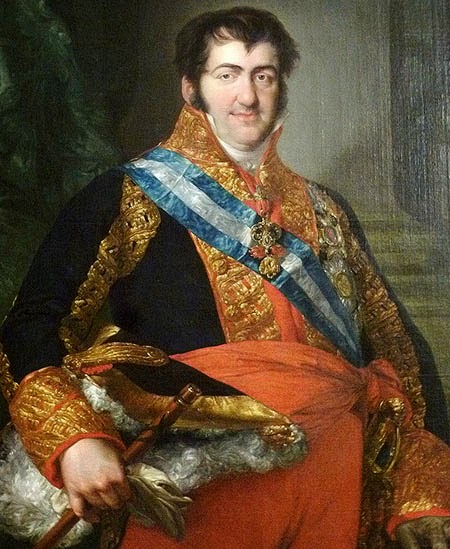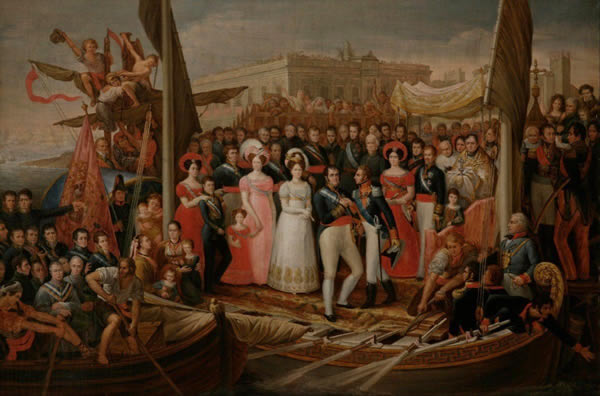 |
| Ferdinand VII |
Ferdinand VII was one of the monarchs of Europe about whom these words by Thomas Jefferson were particularly fitting: “I was much an enemy of monarchies before I came to Europe. I am ten thousand times more so since I have seen what they are. There is scarcely an evil known in these countries which may not be traced to their king as its source, nor a good which is not derived from the small fibres of republicanism existing among them.”
The future Ferdinand VII was excluded from any real role in the government of Spain by his father, King Charles (Carlos) IV; his mother, Queen Maria Luisa; and her lover, Manuel Godoy, who in many ways was the most powerful figure in the kingdom.
Ferdinand’s animosity toward Godoy and his mother and father was serious. In 1807 Charles IV actually had Ferdinand arrested for a plot to overthrow him and to assassinate his mother and Godoy. In 1808 a palace revolt broke out against Godoy and his friendly policy toward Napoleon I.
  |
Godoy was neutralized and Charles IV abdicated in favor of his son. Ferdinand VII at last became king and then proceeded to throw away (at least for a time) his throne. In 1807 Napoleon sent troops through Spain to Portugal.
Persuaded to meet Napoleon across the frontier in Bayonne, France, Ferdinand was immediately imprisoned. Napoleon gave Ferdinand’s crown to his brother Joseph Bonaparte, and for the next six years Ferdinand lived as a prisoner of Napoleon safely guarded in France.
Napoleon apparently believed that the Spanish people would accept his brother as king with the rightful heir sitting in a French prison. When a French army invaded Spain and occupied Madrid in May 1808, a revolt broke out against the French troops, who most likely felt they were actually bringing modern liberty to a people still governed by the Inquisition.
 |
| Ferdinand VII disembarks at Puerto de Santa María |
The revolt gave the British the excuse to exploit their naval supremacy. While England’s first attempt ended in defeat, General Arthur Wellesley, the future duke of Wellington, landed on Spanish shores in August 1808.
Wellington managed to win impressive victories against the French marshals sent to fight him. After Napoleon’s initial invasion of Spain from 1807 to 1808, he never returned. Yet while the Spanish people had fought the French mightily and sought the restoration of their king, they had also drunk deeply of the French ideas of liberty, equality, and fraternity.
When Ferdinand returned to Spain victorious, his people expected a liberal monarchy under him, not a return to the authoritarian rule of his father. However, when he returned to Spain, he abrogated the constitution of 1812 empowered by the Spanish parliament and attempted to rule as a despot.
   |
Under his rule, secret societies like the Freemasons and the Carbonari began to unify public opinion against him. In January 1820 the Spanish army officer Rafael del Riego y Núñez led a successful uprising against the king. The rebellion became widespread, and the Spanish troops could not—or would not—suppress it.
Thus Ferdinand VII, in order to hold onto his throne, had to accept the constitution. However, Ferdinand’s conversion to a liberal government was only a tactical move—he had no intention of governing with any limitations on his powers.
Ferdinand appealed to the monarchical Holy Alliance, which had been formed to stamp out the egalitarian thought that had spread to wherever in Europe a French soldier had carried his knapsack.
The Holy Alliance was the mystical creation of Czar Alexander I of Russia, who was determined after Napoleon’s ultimate defeat at Waterloo in June 1815 that no Napoleon should ever again disrupt the peace of the crowned heads of Europe.
Finally, after the Congress of Verona in 1822, the restored French king Louis XVIII was given the job of crushing the forces of liberalism in Spain. This time, the French troops, royalist now, found a welcome in the reactionary sector of Spanish society.
Although Ferdinand VII had promised liberal terms to his opponents, many of these foes were executed. For the rest of his reign until his death in 1833, Ferdinand governed by force of arms.